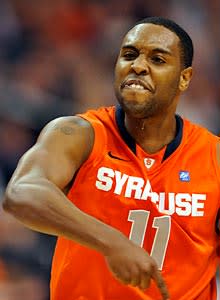Time for schools to ban Twitter
In February, after guard Ravern Johnson questioned his coaching tactics on Twitter, Mississippi State coach Rick Stansbury announced that his entire team would be prohibited from posting on the website until the end of the season. Six months later, it appears Stansbury made a mistake.
The ban should’ve been permanent.
Not just at Mississippi State, where a handful of profanity-laced remarks led to freshman D.J. Gardner’s dismissal from the team last week. With the 2011-12 season fast approaching, coaches at every Division I school in the country should revoke their players’ Twitter privileges immediately. Let them tweet all they want after their career.
But not during it.
Twitter is beneficial for people in the workforce, and there’s no denying its ability to inform and entertain. For some, it’s downright addicting, and that’s not necessarily a bad thing.
College athletes, however, have no business on Twitter. There simply aren’t enough positives to outweigh the potential negatives that can surface when they’re allowed to post.
Week after week the last two seasons, it seemed as if a different college coach has found himself dealing with a new distraction, a new headache created by Twitter. In February, Syracuse guard Mookie Jones took to Twitter to complain about a lack of playing time. A few months earlier Jones’ teammate, Scoop Jardine, shared with his followers what he’d learned in college: “#collegetaughtme that groupies really exist! But we just call them #teamplayers! Ahaha”
Syracuse must have been so proud.
“I always put out positive stuff,” Jardine told reporters later, “but it was one of those days where we were just having fun, then it got blown out of proportion.”
Exactly.
Not many players are as well-liked by the media as Jardine. He’s funny, articulate and seems like a stand-up guy. But he made himself look terrible with that tweet, along with several others. Even worse is that he made Syracuse look bad. That’s the thing athletes forget. They’re representing more than themselves as they pound away at their keyboards. Their names are synonymous with a school, a state and a fanbase. One emotional tweet can lead thousands of people to form opinions that may not be true.
Jardine has said he views Twitter as a place to vent and express emotions. There’s nothing wrong with doing either of those things. They’re healthy. But that’s what teammates and roommates and coaches and family members are for. Grievances should be aired out in front of friends and close confidants.
Not the entire world.
Jardine shut down his Twitter account after the controversial tweets. But a week or so later he opened a new one. He just couldn’t stay away.
In February, J’Covan Brown was forced to close his Twitter account following a series of profane tweets about playing time. Brown said his cousin, who he declined to identify, logged in under Brown’s name and made the posts.
Last August, Rutgers guard Tyree Graham got an earful from coach Mike Rice after tweeting that he’d torn his anterior cruciate ligament before the school could release the information.
Even when players are posting messages that don’t relate to basketball, they often make themselves look bad by using curse words and by firing back at opposing fans who may just be attempting to get under their skin.
Some folks have had enough.
St. John’s coach Steve Lavin and former Missouri coach Mike Anderson, who is now at Arkansas, both banned their players from posting on Twitter last season. In football, South Carolina’s Steve Spurrier and Kansas’ Turner Gill have also put a moratorium on tweets for the entire course of the season.
“We have some dumb, immature players that put crap on their Twitter, and we don’t need that,” Spurrier said. “So the best thing to do is just ban it.”
Spurrier’s decision came in the wake of several tweets from his players that were vulgar, graphic or sexually explicit in nature. One player described his bathroom activities and another said he would’ve transferred away from the school if his infant daughter hadn’t been born within the last year.
Spurrier won’t have to worry about those kinds of things this season. He can coach his football team. Problems will arise, sure. They do at every school. But at South Carolina there won’t be any more issues involving dumb comments made on a social media website.
Hopefully more schools will follow South Carolina’s lead.
If it affects how they do their job – and clearly, it has – coaches have every right to prohibit their players from using Twitter. Today’s college athletes went the first 16 to 20 years of their lives without using the website. They can go without it a little while longer.
Other popular stories on Yahoo! Sports:
• Nationals Park beer vendor saves choking child
• NFL star Jeremy Shockey saves teammate's life
• Top high school hoops prospect criticizes NBA


